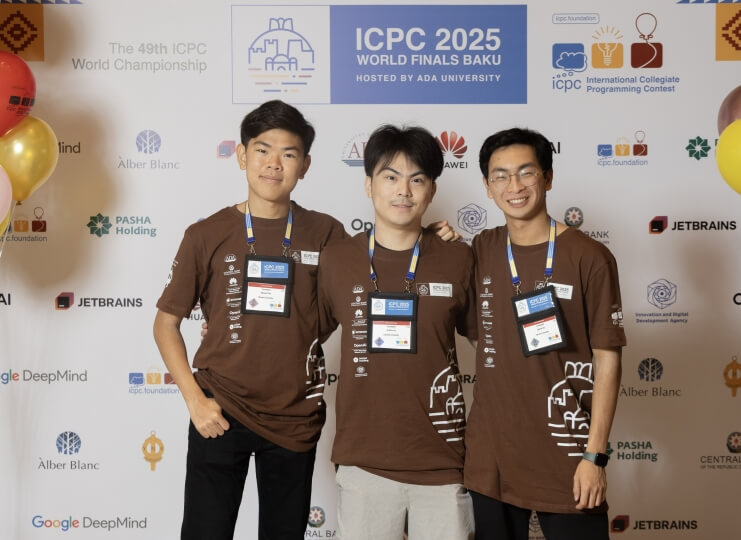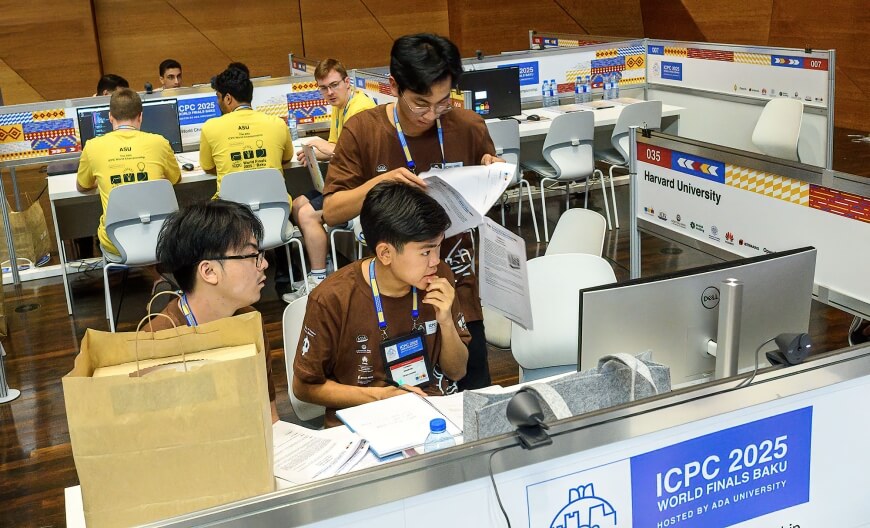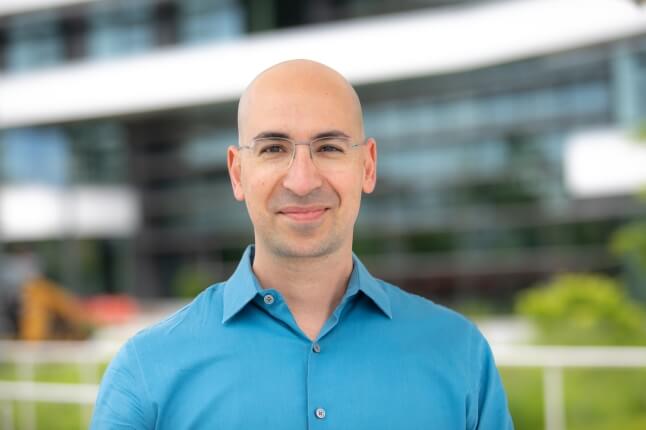News
The Harvard Computing Contest Club of Maxwell Zen, Andrew Gu and Gabe Wu at the 2025 International Collegiate Programming Contest World Finals in Baku, Azerbaijan
Hundreds of students hovered around desktop computers in a conference hall in Baku, Azerbaijan. Marshals prowled up and down the aisles watching for rules violations. Balloons floated at each table to indicate solved problems, and a giant leaderboard let every team know who was ahead, and who had work to do.
That was the atmosphere at the 2025 International Collegiate Programming Contest (ICPC) World Finals, the world championships for competitive coding. The Harvard Computing Contest Club (HC3) has been a mainstay at the ICPC for decades, but top finishes have been a rarity.
But this year’s team, composed of three current or former computer science concentrators at the Harvard John A. Paulson School of Engineering and Applied Sciences (SEAS), came to play. The trio of Gabe Wu, A.B. ‘25, Maxwell Zen, A.B. ‘26 and Andrew Gu, A.B. ‘26, brought home a silver medal with a sixth-place overall finish. The team was also the top finisher among North American teams, something no Harvard team had accomplished since 2016.
“This was the best performance I’ve had in my life,” said Wu, who took off from work at OpenAI in San Francisco to rejoin his teammates. “It was one last blast, one throw back to the time before I was an adult with a job, and could just take off for a week and go to Azerbaijan and solve some problems.”
The 2025 World Finals consisted of 12 problems that needed to be solved over five hours. Topics included developing optimal strategies for games, designing a waste storage system for a fictional toxic substance, and determining how often cosmic rays might strike a Mars rover. Each team was given just one desktop to program solutions, so maximizing the use of their time was critical.
“We worked on multiple problems in parallel, so while one person is coding up a solution to a problem, since it’s not practical to have two people staring over his shoulder, they’ll be working on something different,” Zen said. “Because we have these well-defined roles within the team, we know if one of us runs into a problem we don’t think we’re capable of solving, we know who to hand it off to. We also developed a pretty good strategy that if we’re working on a problem and we think we’re almost there, we usually know who to go to as that second person for perspective. Being able to quickly form groups and change our focus problems is what led to our success.”
Harvard Computing Contest Club team Andrew Gu, Maxwell Zen and Gabe Wu work on a coding problem at the 2025 International Collegiate Programming Contest World Finals in Baku, Azerbaijan
The club’s biggest moment of the contest came on Problem K, which involved determining how to dig for sunken pirate treasure given that ocean features have changed since the treasure map was created. Harvard was the first team to solve Problem K, leading to a burst of enthusiasm that became a quite popular reel on ICPC’s social media.
“Very early on, Andrew was looking at it, and he made the key insight that the problem was geometric, and there was this condition where two interpolations had to be equal,” Wu said. “He saw the key formula that characterized that condition, then told me to look at it. Once I looked at it, we figured out together what to do. The keyboard was free, so I coded it up, and we ended up solving it first. That was very exciting.”
Gu added, “I was mainly looking at problems and thinking about how they should be approached. The great thing about ICPC is it’s not completely based on algorithms and data structures. Mathematical insights can help too.”
Solving another problem briefly put HC3 in first place on the leader board, though it didn’t last. The club ultimately solved nine of the 12 problems, tying several other schools for the fourth-most correct answers but finishing sixth because two other schools solved faster. The world champions, St. Petersburg State University from Russia, solved 11.
“The problems are fun, and I enjoy working on a team,” Gu said. “If I were to do this contest by myself, it would’ve been much more difficult to code anything.”
HC3 qualified through the North American Championships, which take place in the spring. Between now and then, Zen hopes to use the club’s success to build up membership.
“Right now, the role of the club is to send a team to ICPC,” Zen said. “If that’s the role of the club, then it’s really hard to come up with a system where people are willing to contribute to the club in more logistical ways such as updating the website or planning meetings. What I’m trying to create here is more of a competitive programming community.”
For this trio, competitive programming offers a way to reframe coding, which often feels like a very mechanical, boring process, despite how critical it is to working in the field. It’s also helped them develop their problem-solving skills, taking what they know about math or computer science and using it to figure out solutions to problems they’ve never seen before.
“If anyone is looking to develop problem-solving intuition, competitive programming is a great way to do that, and a great way to be exposed to a community of people who are very passionate,” Zen said. “Competitive programming is a way to turn coding into competition, something in which a lot of people gather together and agree it’s a very fun and rewarding experience. It’s a way to gain these skills that end up being necessary down the line in a way that is very gamified and fun and enjoyable.”
Topics: Alumni, Computer Science, Student Organizations
Cutting-edge science delivered direct to your inbox.
Join the Harvard SEAS mailing list.
Press Contact
Matt Goisman | mgoisman@g.harvard.edu




